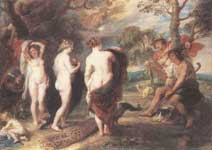.
Everything that can be invented has been invented. Charles H. Duell, U.S. Commissioner of Patents, in 1899 (a remark which probably was invented by others!Griechische Erfindungen
The most important Ancient Greek invention was the invention of True and not only Applied Science around 600 BC with Thales.
But as more arts were invented, and some were directed to the necessities of life, others to recreation, the inventors of the latter were naturally always regarded as wiser than the inventors of the former, because their branches of knowledge did not aim at utility. Hence when all such inventions were already established, the sciences which do not aim at giving pleasure or at the necessities of life were discovered, and first in the places where men first began to have leisure. This is why the mathematical arts were founded in Egypt; for there the priestly caste was allowed to be at leisure. Aristotle Metaphysics
The Invention of Knowledge (HTML) or (PDF 2MB)
A - B - C - D - E - F - G - H - I- J - K - L - M -
N - O - P - Q - R - S - T - U - V - W - X - Y - Z
Promotion of Inventions
It must have been assisted by the great discovery of the early part of the former century, the invention of coined money. To the Lydians, rather than the Greeks, belongs the credit of the discovery; but it was the genius of the latter race that divined the importance of the invention and spread its use. The coinage of the Ionian towns goes back to the reign of Gyges (c. 675 B.C.). And it is in Ionia that commercial development is earliest and greatest. In the most distant regions the Ionian is first in the field. Egypt and the Black Sea are both opened up to Greek trade by Miletus, the Adriatic and the Western Mediterranean by Phocaea and Samos. It is significant that of the twelve states engaged in the Egyptian trade in the 6th century all, with the exception of Aegina, are from the eastern side of the Aegean (Herod. ii. 178). On the western side the chief centres of trade during these centuries were the islands of Euboea and Aegina and the town of Corinth. The Aeginetan are the earliest coins of Greece proper (around 650 BC); Ancient History Sourcebook: 11th Brittanica: History of Ancient Greece
Jacob's staff
Developed from Ptolemy's Triquetrum
Der Jakobsstab, Winkelmessinstrument der alten Seefahrer (German)
Maps
Although some believe that maps were produced first around 6200 BC the first reference in Western literature of a map is from Herodotus account of the interview between Aristagorous, tyrant of Miletus, and the Spartans. The first Greek assumed to have produced maps was Anaximander (c. 610-546 BC). Dikaiarch of Messina (350-290 BC) a Greek geographer introduces to the map making world the notion of latitude and longitude. Later Eratosthenes and Strabo produced the first Maps of the entire known World. Claudius Ptolemy who lived and worked in Alexandria, Egypt during the first half of the second century AD created a system of geographical knowledge (Guide to Geography c. 140 AD) that dominated the field for a millennium and a half.
He produced a world map with 26 regional maps and 67 local maps (all lost). Eight books in all.
He used a regular grid of parallels and meridians, i.e. a coordinate system (before Descartes).
Supported corrections of scale distortions in other maps, i.e. introduced map projections.
Mentions use of gnomon and astrolabe for pole star & sun.
Discounts travel stories.
Included a gazeteer (data bank) of about 8000 localities with their supposed longitudes and latitudes, and even appropriate captions for the maps. By 1740, only 116 places known.
See: Ptolemy the Geographer and his Maps
Thermometer
"The Greeks of Alexandria knew that air expanded as it was heated, and Philo of Byzantium, who was alive at the time of the birth of Christ, made a 'thermoscope' that must have been very like Galileo's air thermometer. But it was Galileo who, in 1592, was the first to put a scale besie the tube. This at once converted the device into a scientific instrument and made it possible to distinguish between temperature and heat. The study of heat as a form of energy depended on this distinction." Solutions to "A Millennium of Inventions
Tumbler Lock
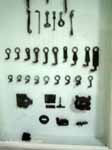
Invented probably in Iraq, and Egypt around 1000 BC. In Greece it was greatly improved compared to the previous locks, which were simply a board drawn across a door. From Greece the lock moved into Europe.
Homer Odyssey 21:
She quickly took the looped thong from its hook,
put in the key, and with a push shoved back the bolt.
Just as a bull grunts when it grazes in a meadow,
that how the key's force made the fine door creak,
and it quickly swung ajar.
References
HISTORY OF LOCKS
Mara Bishop and Amanda Payne Burton (Museum of Inventions)
Central Heating
Central heating appears to have been invented in ancient Greece, but it was the Romans who became the supreme heating engineers of the ancient world with their hypocaust system. Central heating was adopted for use again in the early 19th century when the Industrial Revolution caused an increase in the size of buildings for industry, residential use, and services." - Britannica
Inventions Painting, Sculture, Music
Chelys-Lyra, Greece, 400 BC
Frame Harp (400 AD)
See Inventions in Sikyon
Comments by Ancient Greeks about Inventions
-
Plato's opinion of the invention of the Alphabet and the possibility to be able to write and thus preserve the knowledge: This invention will produce forgetfulness in the minds of those who learn to use it, because they will not practice their memory. Their trust in writing, produced by external characters which are no part of themselves, will discourage the use of their own memory within them. You have invented an elixir not of memory, but of reminding; and you offer your pupils the appearance of wisdom, not true wisdom, for they will read many things without instruction and will therefore seem to know many things, when they are for the most part ignorant and hard to get along with, since they are not wise, but only appear wise. Phaedrus 275b
More Strange Stories about Ancient Greeks Inventions
The following history was written by Semi J. Begun who pioneered magnetic tape recording at the Brush Development Company in Cleveland, Ohio. Begun immigrated from Germany in 1938 where he had developed a steel-tape recorder for the C. Lorenz Company. In 1939, he led the research program at Brush Development that produced recording equipment for the U. S. military in World War II. This is the first chapter of the book he wrote in 1949 on magnetic recording.
Myth and folklore abound with tales of how the human voice has been captured or preserved, but the only known early attempts to realize this idea were the efforts to construct mechanical devices which would "talk." As early as the third century BC, (actually it was more likely 10-70 AD) Heron of Alexandria is said to have devised automata which would talk or emit the cries of animals. The earliest such device of which we have any actual knowledge is the one constructed by De Kempelein of Vienna, who, in 1791, published a description of it under the title "The Mechanism of Speech, Followed by a Description of a Talking Machine." De Kempelein's device could be made to speak short sentences.
http://history.acusd.edu/gen/recording/begun1.html
Hula hoop
Information that I have found:
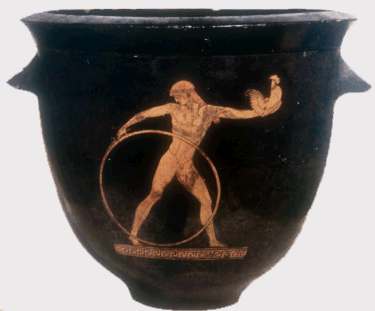
Ganymedes shown playing the game “hoop-bowling” Red-figure Bell Krater, The Berlin Painter. c. 490-480 BC
Hoops were used in Egypt around 1000 BC from grape leaves and were propelled around the ground with sticks. The ancient Greeks recommended their use for losing weight. Hooping was used in the 14th century in England but the physicians blamed it for heart attacks and back dislocations. The word "hula" comes from Hawaii around 1800.
Archytas sphere
From the Technology Museum of Thessaloniki:
According to a description Archytas except his flying machine is also credited with an amazing account of a journey around the world in a hermetically sealed sphere! (How many days did he need for this? 80 days like Jules Verne?)
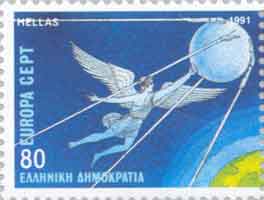
He wrote a book Description of the circuit of a hermetically closed sphere around the earth (Concept of the satellite???) according to the Technological Museum of Thessaloniki. More very strange stories and speculations: Did people from ancient India visit the Greeks and reported of the use of Automata and the flying machines of Archytas (the Vimanas of India)? Are the Yavanas of India Greeks? More at http://www.qtm.net/~geibdan/oldufos/vimanas.html .
PIZZA
An invention mentioned sometimes supposed to be from Byzantium is the PIZZA. This would be a significant contribution although Wikipedia says that PIZZA was invented together by the ancient Greeks in Italy and the Etruscans, i.e. centuries before the formation of “Byzantium” (although I could not find any reliable original sources for both stories and I can imagine that PIZZA was invented even much much earlier..).
Who really invented the telephone ?
REMARKS
Some of the inventions listed here were made also independently in other places and even much earlier. The catapults for example may have been known earlier in Persia, although the Greek science improved their performance significantly. The list is far from complete and I would be happy to learn more about inventions not listed or more details and suggestions. E-mail: mlahanas@gmx.net
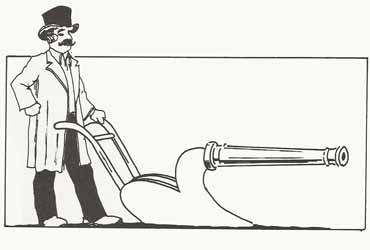
Canon and Plow Combination, US Patent 35600
- Duncan B. Campbell, Brian Delf (Illustrator),
Greek and Roman Artillery 399 BC - AD 363
, Osprey Publishing, Limited 2003, ISBN: 1841766348
William Gurstelle , The Art of the Catapult: Build Greek Ballistae, Roman Onagers, English Trebuchets, and More Ancient Artillery
,Chicago Review Press (July 1, 2004) ISBN: 1556525265
- Adrienne Mayor, Greek Fire, Poison Arrows & Scorpion Bombs: Biological and Chemical Warfare in the Ancient World
, Overlook Hardcover; 1st edition (September 29, 2003) , ISBN: 158567348X
A - B - C - D - E - F - G - H - I- J - K - L - M -
N - O - P - Q - R - S - T - U - V - W - X - Y - Z
| Ancient Greece
Science, Technology , Medicine , Warfare, , Biographies , Life , Cities/Places/Maps , Arts , Literature , Philosophy ,Olympics, Mythology , History , Images Medieval Greece / Byzantine Empire Science, Technology, Arts, , Warfare , Literature, Biographies, Icons, History Modern Greece Cities, Islands, Regions, Fauna/Flora ,Biographies , History , Warfare, Science/Technology, Literature, Music , Arts , Film/Actors , Sport , Fashion --- |

